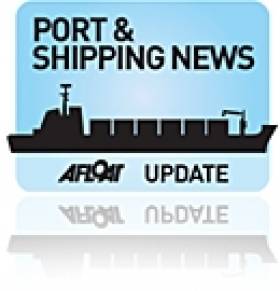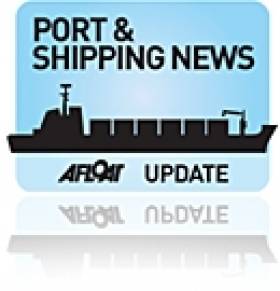Displaying items by tag: Ports &Shipping News
IMDO Review: Fears of Marine Test Site, Operator Adds to Global Decline & Port Profits Rise
#IMDOreview: The Irish Maritime Development Office (IMDO) Weekly Market Review which is produced in-house returns this week with coverage of domestic and global shipping news.
test site off Spiddal could pave the way for a fish farm in Galway Bay ‘through the back door’.
Global Maritime News: Hanjin’s returning: Charters and Selling Ships, Depressing Global Shipping Assets Hanjin Shipping's asset sales have started with three ships under charter sold by their owners last week, setting off a potential decline in ship values worldwide as the beleaguered maritime industry comes under renewed pressure.
Abu Dabi Port Profit up 77% in the First Half of 2016 Abu Dhabi Ports on Tuesday reported a 77 per cent rise in net profit for the first half of the year on the back of growth across all segments. The ports operator, which said revenue grew 20 per cent during the period, did not provide a monetary value.
For more stories of this edition which is available here in addition to Afloat's dedicated Ports & Shipping news coverage.
Track the SUNY Voyage of US Trainee Vessel Around the World
#EmpireState – Training vessel Empire State VI is on its annual summer sea term, that is one of the requirements to earning a U.S. Coast Guard license.
The former cargoship now trains the cadets of the SUNY - State University of New York, which is to make a visit to Dublin Port next week having departed Norfolk, Virginia in early May.
As part of the program, cadets - either deck or engine license candidates - must accrue at least 180 days at sea before they graduate.
Time is earned during summer sea term journeys after freshman, sophomore and junior years.
Through the summer sea term, cadets travel around the world gaining vital hands-on experience in operating the 565ft steam-powered vessel and dealing with port traffic.
Cadets on board the ship will use the vessel as a floating lab during the school year.
The cruise itinerary changes every year to include ports around the U.S. East Coast and Europe.
This year the ship is scheduled to travel to Trieste, Italy; Mallorca and Barcelona, Spain; and Valletta, Malta before returning to campus in early August.
To follow the progress of the summer sea term by tracking the vessel here.
ECA Believes Marco Polo Rail Programmes Have Failed
#MarcoPolo- According to a new report, published yesterday by the European Court of Auditors (ECA), Marco Polo programmes have been ineffective and should be discontinued in their current design. The programmes are aimed at shifting freight away from the road towards other modes of transport, using EU funds.
One of the main findings of the audit was that there were serious indications of "deadweight" referring to projects which would have gone ahead even without EU funding. In fact, 13 of the 16 beneficiaries audited confirmed that they would have started and run the transport service even without a subsidy.
In addition, there were no reliable data to assess benefits on the environmental impact of freight transport, road congestion or road safety. The audit also found that there were not enough relevant project proposals put forward because the market situation and the programme rules discouraged operators from taking advantage of the scheme. Half of the audited projects were of limited sustainability.
"The programmes were ineffective as they did not meet the targets, little impact was achieved in shifting freight off the roads and there were no data to assess the achievement of the policy objectives" said Ville Itälä, ECA member responsible for the report.
Since 2003, the Marco Polo I and II programmes have financed transport service projects designed to shift freight transport from road to rail, inland waterways and short sea shipping. The programmes have been part of the EU transport policy objective to develop alternatives to road-only freight transport.
This generally accepted objective aims to reduce international road freight traffic, thereby improving the environmental performance of freight transport, reducing congestion and increasing road safety.
Given the results of the current programmes, ECA recommends discontinuing EU funding for transport freight services following the design of the Marco Polo programmes.
In the future, such funding should depend on an impact assessment at the outset, showing whether and to what extent there is EU added value. This should involve a detailed analysis of potential demand and best practice in the Member States.
Irish Ports Witness Surge in Animal Feed Imports
#FodderShipments – As Irish Farmers struggle with one of the worst fodder crisis in over 50 years, ports across the country have seen unprecedented levels of animal feed imports, according to the Irish Maritime Development Office (IMDO).
Most of the State's ports have seen notable throughput increases since the third quarter of 2012, after a poor summer period for farmers. The IMDO noted that the first quarter of 2013 saw volumes of animal feed increase by over 80% in terms of bulk shipments, on the corresponding period last year.
In the recently published Irish Maritime Transport Economist, the IMDO reported substantial annual growth in animal feed imports, which increased by 34% during 2012.
A number of farming interest groups have come together to support the importation of animal feed from the UK and France in recent months, resulting in increased activity on Irish Sea ferry services, particularly over the last three weeks.
The IFA sourced the first consignment of hay from France which arrived at Rosslare Europort on the 9 May aboard the ro-pax ferry Celtic Horizon.
During this month's bank holiday, ports also recorded increased fodder imports from bulk shipments.
The western and northern parts of the country appear most severely impacted and it is anticipated that fodder will continue to steadily arrive at Irish ports for the foreseeable future.



























































